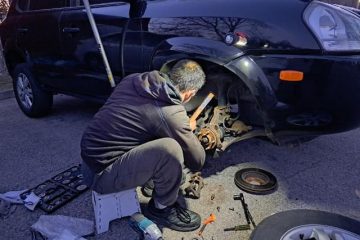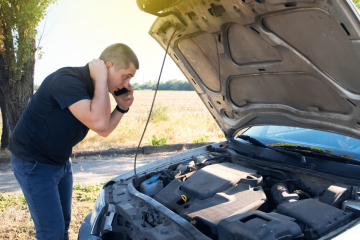Getting your car ready for a mobile mechanic visit doesn’t have to be a headache. In fact, with a little prep work, you can make the whole process smoother for both you and the mechanic. Let’s dive into some practical tips that’ll save you time, money, and stress.
Why Prepping Your Car Matters
You might be wondering, “Why bother prepping my car? Isn’t that the mechanic’s job?” Well, yes and no. While the mechanic is there to diagnose and fix issues, a little preparation on your part can make their job easier and more efficient. This means less time spent on your repair, which often translates to lower costs for you.
Plus, being prepared shows the mechanic that you care about your vehicle and their time. It sets a positive tone for the whole interaction.
Clear the Path: Make Way for Your Mobile Mechanic
First things first, let’s talk about access. Your mobile mechanic needs to get to your car, right? So, take a look around your driveway or parking spot. Is there anything in the way?
Here’s what you should do:
- Move bikes, toys, or other objects that might block the mechanic’s path.
- Trim back any overgrown bushes or tree branches near your car.
- If you’re in an apartment complex, make sure the mechanic knows where to park.
- In winter, shovel any snow around your car.
Remember, the easier it is for the mechanic to get to your car, the quicker they can get started on the actual work.
Check Your Fluids: A Quick DIY Inspection
Before the mechanic arrives, it’s a good idea to check your car’s fluid levels. This includes:
- Engine oil
- Coolant
- Brake fluid
- Power steering fluid
- Transmission fluid
Don’t worry, you don’t need to be a car expert to do this. Most cars have easy-to-read dipsticks or reservoirs for these fluids. If you’re not sure how to check, your car’s manual should have clear instructions.
If any of these fluids are low, top them up if you can. If they’re significantly low or empty, let the mechanic know when they arrive. This could be a sign of a leak or another issue that needs attention.
Battery Check: Power Up Your Prep
Your car’s battery is like its heart – without it, you’re not going anywhere. So, give it a quick once-over before the mechanic arrives.
Look for:
- Corrosion on the terminals (that white, crusty stuff).
- Loose connections.
- Cracks or bulges in the battery case.
If you spot corrosion, you can clean it off with a mixture of baking soda and water. Just make sure the car is off and cool before you start.
A heads-up about battery issues can save your mechanic time and help them come prepared with the right tools or a replacement battery if needed.
Tire Talk: Don’t Tread Lightly on This Step
Your tires are literally where the rubber meets the road, so they deserve some attention. Here’s what to check:
- Tread depth: Stick a penny in the tread groove with Lincoln’s head upside down. If you can see all of Lincoln’s head, your tread is too worn.
- Air pressure: Use a tire pressure gauge to check all four tires, including the spare.
- Visible damage: Look for cuts, bulges, or objects stuck in the tires.
If you spot any issues, let your mechanic know. They might need to factor in tire repair or replacement in their visit.
Light It Up: A Bright Idea for Car Prep
Working on a car is tough enough without having to squint in the dark. So, make sure all your car’s lights are working properly. This includes:
- Headlights (low and high beams).
- Taillights.
- Brake lights.
- Turn signals.
- Reverse lights.
- Interior lights.
If any bulbs are out, your mechanic can replace them during the visit. But knowing about it in advance helps them come prepared with the right bulbs.
Interior Clean-Up: Clear the Clutter
You might not think the inside of your car matters for a mechanical issue, but trust me, it does. A clean, organized interior makes it easier for the mechanic to access different parts of the car if needed.
Here’s a quick interior prep checklist:
- Remove personal items from the front seats and floor.
- Clear out the center console and glove compartment.
- Take out any trash or unnecessary items.
- Vacuum the floors if you have time.
This not only helps the mechanic but also prevents your personal items from getting lost or damaged during the repair process.
Document Dive: Get Your Paperwork in Order
Before the mechanic arrives, gather up any relevant paperwork. This might include:
- Your car’s manual.
- Service records.
- Warranty information.
- Insurance documents.
Having these on hand can help the mechanic understand your car’s history and any coverage you might have for certain repairs.
Symptom Summary: Be Ready to Explain the Issue
You know your car best. If you’ve noticed any specific issues or symptoms, jot them down before the mechanic arrives. Think about:
- When did the problem start?
- Does it happen all the time or only under certain conditions?
- Are there any unusual noises, smells, or vibrations?
The more information you can provide, the easier it’ll be for the mechanic to diagnose and fix the problem.
Weather Watch: Plan for the Elements
If you’re having the mechanic come to your home, consider the weather. If it’s going to be hot, try to park your car in a shaded area. If rain is in the forecast, see if you can arrange a covered spot.
Not only does this make the mechanic’s job more comfortable, but it can also prevent weather-related delays or complications during the repair.
Tool Time: Gather Basic Tools
While your mobile mechanic will bring their own tools, having a few basics on hand can be helpful. Consider having:
- A flashlight.
- Basic socket set.
- Screwdrivers.
- Pliers.
- Jack and jack stands (if you have them).
These can come in handy if the mechanic needs an extra hand or a specific tool they might not have brought.
Communication is Key: Be Available
Last but not least, make sure you’re available when the mechanic is scheduled to arrive. Keep your phone handy in case they need to reach you with questions or updates.
If you can’t be there in person, make sure someone who knows about the car issues can be present or at least reachable by phone.
Real-Life Success Story: Sarah from Denver
Sarah, a graphic designer from Denver, Colorado, shared her experience with prepping for a mobile mechanic visit:
“I was skeptical about using a mobile mechanic at first, but I decided to give it a try when my car started making a weird noise. I followed the prep steps I found online, and it made such a difference! The mechanic, Tom, was able to get right to work because I had cleared the area and checked my fluids beforehand. He even commented on how refreshing it was to work with someone so prepared. The whole process was smoother and quicker than I expected, and I ended up saving money on labor time. Now, I always prep my car this way before any service.”
Environmental Considerations
While prepping your car for a mobile mechanic visit, it’s worth considering the environmental impact. Mobile mechanics often have a smaller carbon footprint compared to traditional auto shops. They don’t need large facilities and can often diagnose issues more efficiently, reducing overall energy consumption.
When checking fluids, be mindful of proper disposal methods for any old fluids. Many auto parts stores offer free recycling for used motor oil and other automotive fluids.
Future Trends in Mobile Mechanics
The field of mobile mechanics is evolving rapidly. We’re seeing trends like:
- Increased use of diagnostic apps and tools.
- Remote diagnostics capabilities.
- Specialization in electric and hybrid vehicles.
- Integration of AI for more accurate problem identification.
As these trends develop, the way we prep our cars for mobile mechanic visits might change too. Staying informed about these advancements can help you be even more prepared in the future.
FAQs
- Q: How long does a typical mobile mechanic visit take?
A: It varies depending on the issue, but most visits take between 1-3 hours. Complex repairs might take longer. - Q: Do I need to provide any tools for the mobile mechanic?
A: Generally, no. Mobile mechanics bring
B: their own tools. However, having some basic tools on hand can be helpful in certain situations. - Q: What if the mechanic can’t fix the problem on-site?
A: Most mobile mechanics can handle a wide range of repairs on-site. If they encounter an issue they can’t resolve, they’ll typically advise you on next steps, which might include towing to a shop. - Q: Is it safe to have a mobile mechanic work on my car at home?
A: Yes, reputable mobile mechanics are licensed and insured. Always check reviews and credentials before booking a service. - Q: How do I pay a mobile mechanic?
A: Payment methods vary, but many accept credit cards, cash, or digital payments like PayPal or Venmo. Confirm the payment options when you book the service. - Q: Can a mobile mechanic perform all the same services as a traditional shop?
A: While mobile mechanics can handle most repairs, some complex jobs might require specialized equipment found only in shops. They’ll let you know if this is the case for your repair.
Preparing your car for a mobile mechanic visit doesn’t have to be complicated. With these steps, you’re setting yourself and your mechanic up for success. Remember, a little prep work can go a long way in making the repair process smoother, faster, and potentially less expensive. So next time you book a mobile mechanic, give these tips a try. Your car (and your wallet) will thank you
The key to a successful mobile mechanic visit lies in your preparation. By following these steps, you’re not just getting your car ready – you’re setting the stage for a more efficient, effective repair process. So roll up your sleeves, give your car some attention, and get ready for a hassle-free mobile mechanic experience. Your well-prepared car is waiting!




